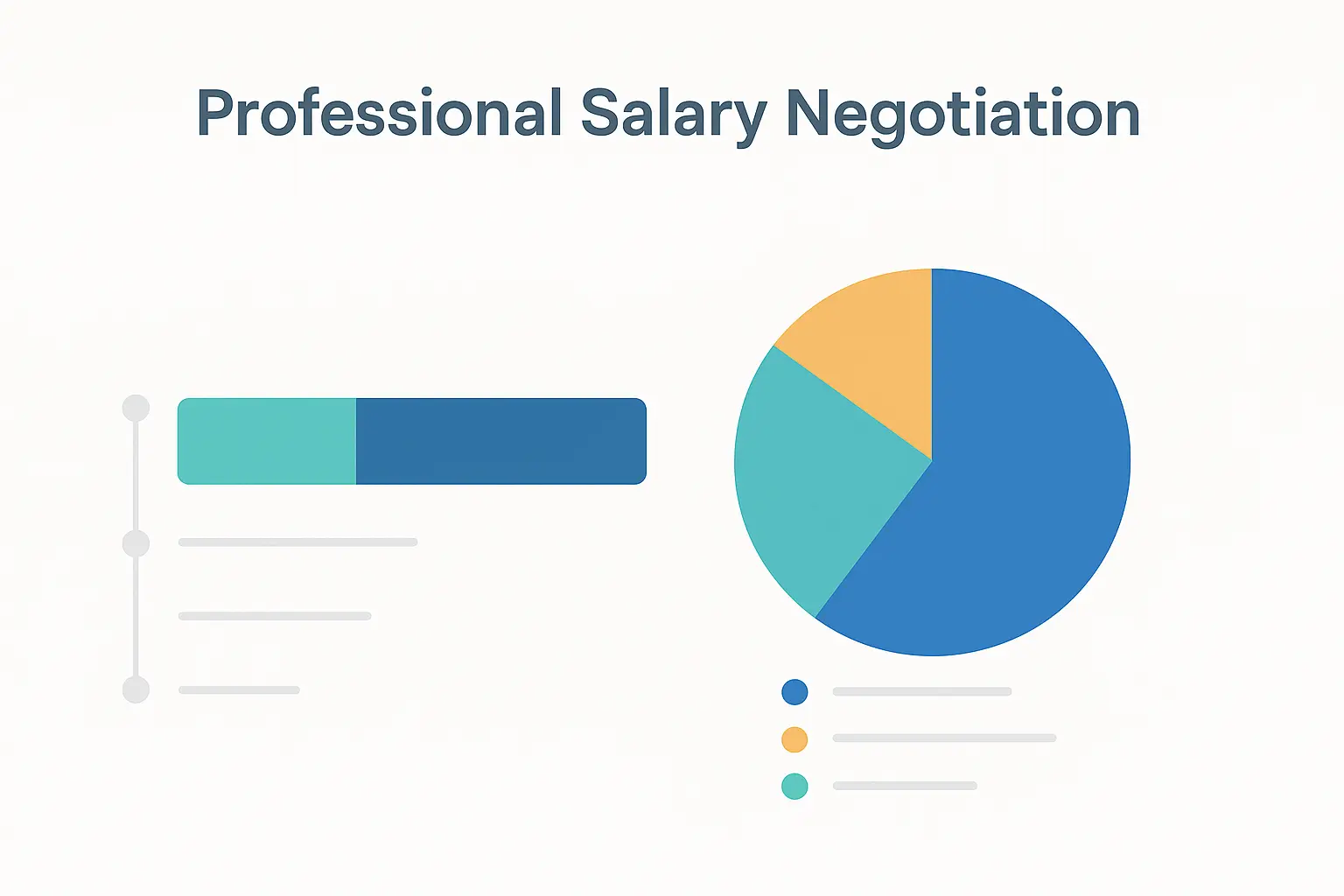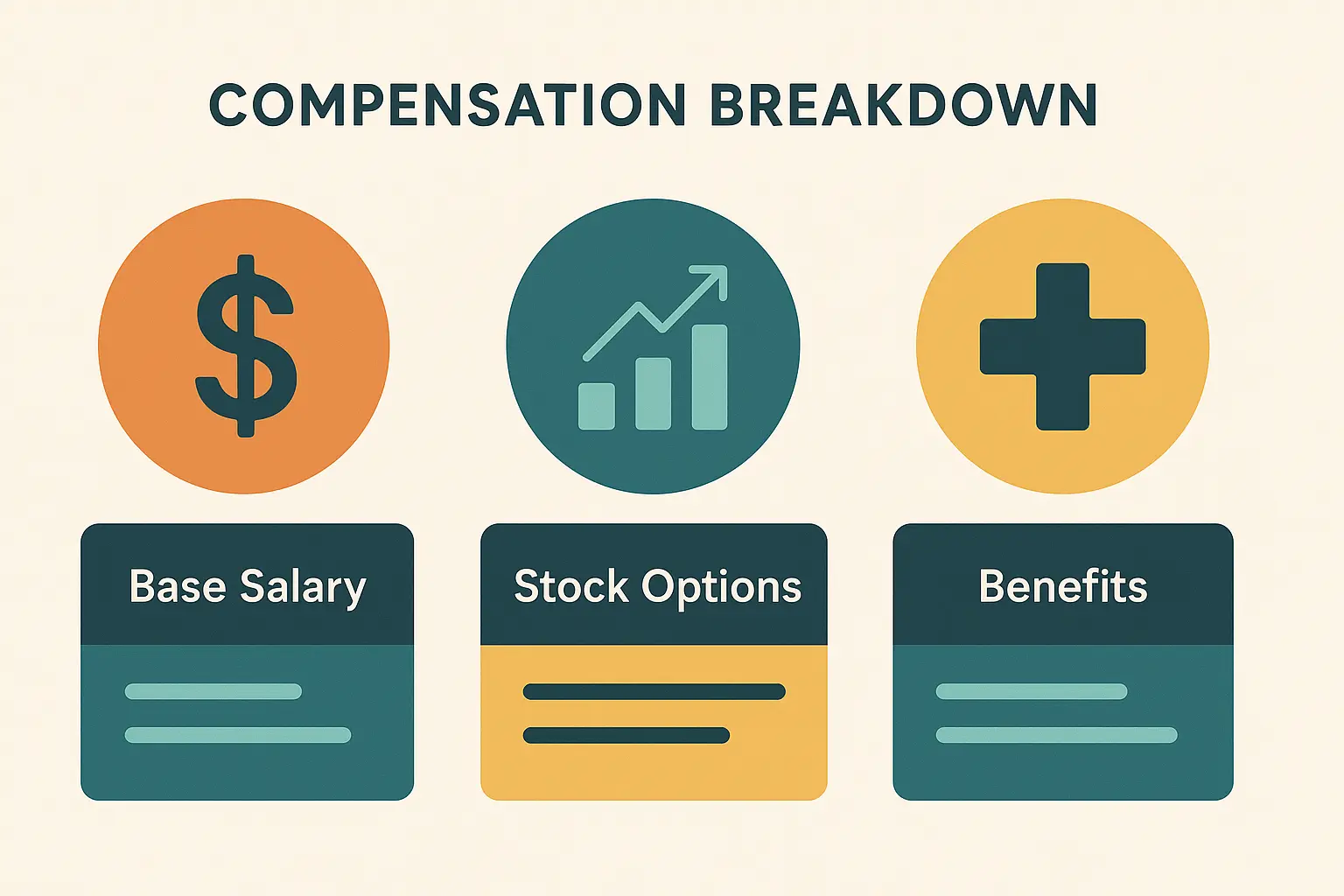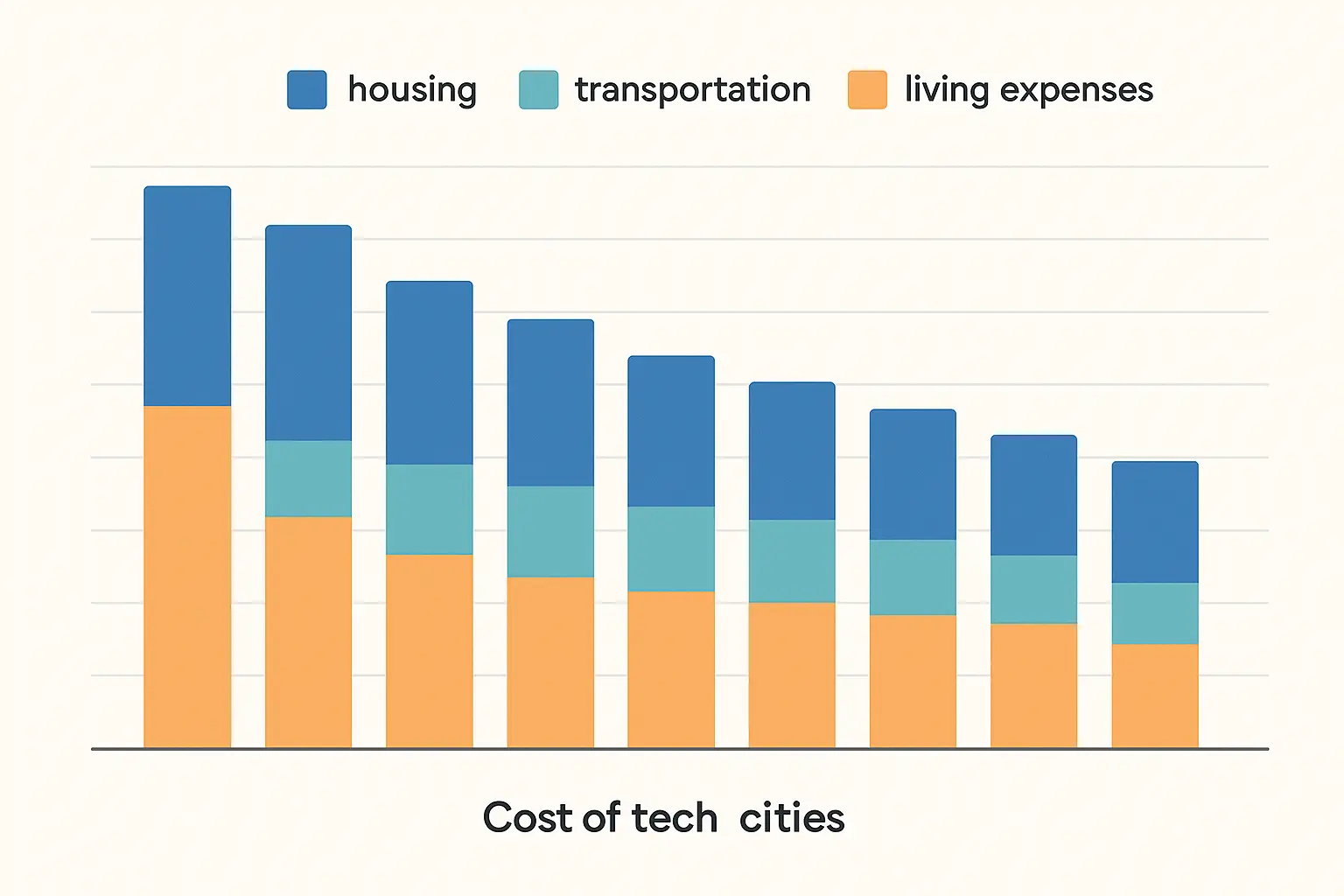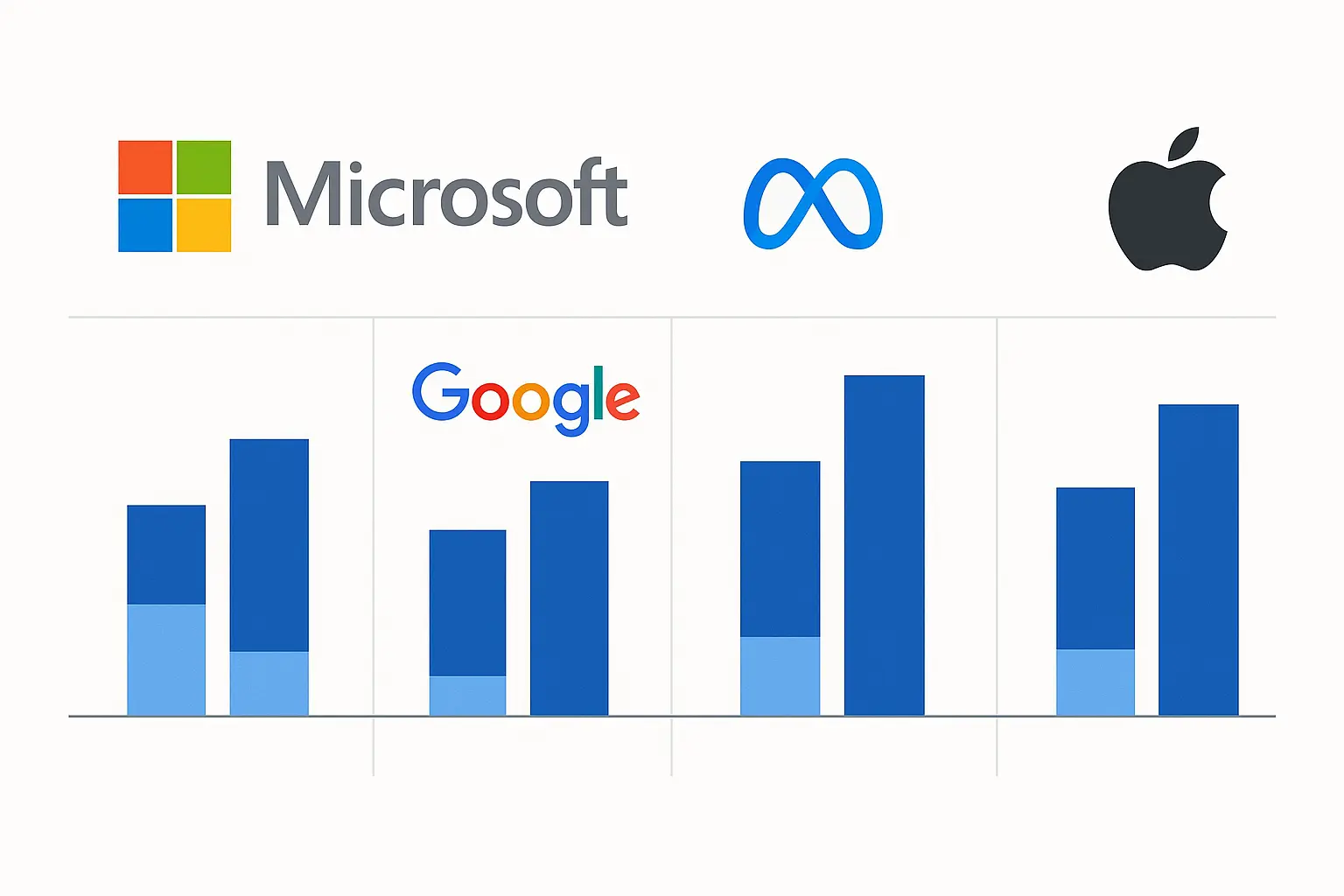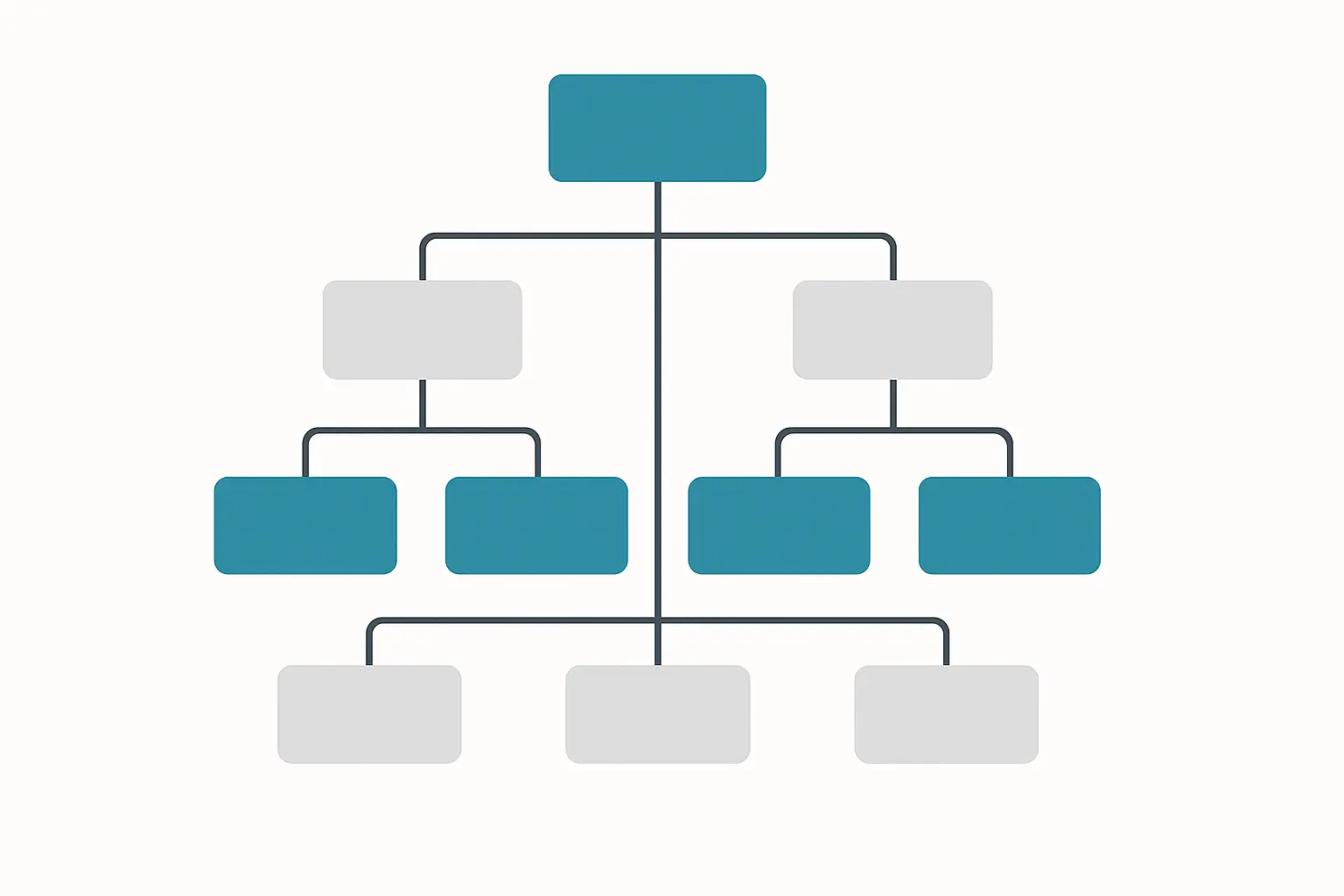Last month, my friend Jake texted me a screenshot of his Google offer letter. I literally spit out my coffee. $287,000. For his first job out of college.
That moment sent me down a rabbit hole of research that lasted three weeks. I talked to current Googlers, analyzed thousands of data points, and even reached out to recruiters. What I found will probably surprise you as much as it did me.
According to recent data from levels.fyi, compensation at Google ranges from $190K per year for L3 to $2.15M per year for L9, with the median yearly compensation package totaling $291K. But here’s what really matters for new graduates: we’re talking about total packages that often hit $200,000-$300,000+ right out of college.
Table of Contents
- Understanding Google’s Current Compensation Landscape
- Breaking Down Your Total Pay Package
- The Reality of Location-Based Salary Differences
- Your Path from Entry-Level to Senior Engineer
- How Google Stacks Up Against Other Tech Giants
- Mastering Salary Negotiations at Google
- Senior Engineer Salary Benchmarks
- Final Thoughts
TL;DR
- Google’s entry-level engineers earn $130,000-$180,000 base salary, with total compensation reaching $200,000-$300,000+ including equity and bonuses
- Silicon Valley positions command the highest salaries ($170,000-$180,000) while remote work may reduce compensation based on your location
- Stock grants worth $50,000-$100,000 vesting over four years significantly boost your total package
- Career progression from L3 to L4 typically happens within 1-3 years and brings 20-40% salary increases
- Google competes directly with Meta, Amazon, and Apple for talent, keeping compensation highly competitive
- Competing offers and specialized skills in ML, distributed systems, or security can increase your starting package by 10-30%
Understanding Google’s Current Compensation Landscape
Look, the tech world has completely flipped since I graduated. Back then, landing a $60K job felt like winning the lottery. Now? That’s what Google pays in quarterly bonuses.
Here’s the thing about Google’s pay strategy – they’re not just throwing money around randomly. They know that today’s CS graduates have options. Serious options. So they’ve built their packages to not just compete today, but keep you around for years.
I’ve noticed something interesting in my research: Google adjusts their aggression based on market conditions. When they’re growing fast, offers get crazy competitive. When things tighten up, they pull back a bit. But even their “conservative” offers still blow away most other companies.
Economic factors play a huge role in Google’s hiring strategies. During periods of rapid growth, the company tends to offer more aggressive packages to secure talent quickly. When economic uncertainty hits, they might be more conservative with initial offers, though their compensation remains among the industry’s highest regardless of market conditions.
What You’ll Actually Take Home
Your base salary will land somewhere between $130K-$180K. But here’s what most people miss – that’s just the foundation.
Where you land in that range depends on a few key things:
- Your school matters (sorry, but it’s true)
- Previous internships carry serious weight
- How you crush the interviews can bump you up significantly
- Market timing – apply when they’re hungry for talent
Take my friend Sarah. Stanford CS, internships at Microsoft and Airbnb, absolutely nailed her Google interviews. Her offer? $175K base, $85K in stock, $25K signing bonus. First-year total: $285K. Not bad for 22 years old.
Your starting salary placement within this range depends on several key factors. Educational background plays a role – graduates from top-tier computer science programs often receive offers toward the higher end. Previous internship experience, particularly at other major tech companies, can also boost your initial placement.
Interview performance matters significantly. Exceptional technical interviews and strong system design discussions can influence your level placement and starting compensation. Google’s hiring committees consider whether you can do the job and how quickly you’ll contribute at a high level.
Location: Where You Work Changes Everything
This is where it gets interesting. Google pays differently based on where you sit, and the math isn’t always obvious.
Location dramatically impacts your compensation. Silicon Valley commands premium compensation due to intense local competition and high living costs. Other major tech hubs offer competitive packages with regional adjustments, while remote work has introduced new location-based pay scales that may reduce compensation for employees in lower-cost areas.
Silicon Valley: The Premium (and the Pain)
Mountain View pays the most – often $170K-$180K base. But before you get excited, let me paint you a picture. My buddy Alex makes $320K total comp there. Sounds amazing, right? His rent for a one-bedroom apartment? $3,800 a month. After taxes and living expenses, he’s got less disposable income than his friend making $280K in Austin.
Google’s Mountain View headquarters offers the highest entry-level salaries, often reaching $170,000-$180,000 in base compensation. This premium reflects the intense competition for talent in Silicon Valley, where multiple tech giants compete for the same pool of engineers, driving up compensation across the board. According to levels.fyi data, the median yearly total compensation for Google engineers in the San Francisco Bay Area is $319,000.
The perks are real though – you’re at the center of everything, the campus is incredible, and the networking opportunities are unmatched. However, you’ll need to factor in Silicon Valley’s notorious housing costs. Even with the salary premium, your disposable income might not exceed what you’d have in other locations after accounting for rent, taxes, and general living expenses.
Other Cities: Better Bang for Your Buck
Seattle’s sweet spot sits around $150K-$170K base. You’re competing with Amazon and Microsoft, so Google has to pay up. Plus, no state income tax in Washington.
Austin’s become a goldmine. Base salaries hit $140K-$160K, but your money goes so much further. One Google engineer I know bought a house there on his second-year salary. Try doing that in San Francisco.
Google’s offices in Seattle, New York, Austin, and other major cities offer competitive compensation packages with regional adjustments that account for local market conditions and cost of living differences. These locations often provide better work-life balance and lower living costs while maintaining substantial earning potential.
New York matches Seattle’s numbers but costs almost as much as Silicon Valley to live in. Austin has emerged as a major tech hub, with Google offering competitive packages that account for Texas’s favorable tax environment and lower cost of living. Many engineers find their purchasing power actually increases despite slightly lower base salaries. Recent reports from Nucamp show that “Google offers an average software engineer salary of $132,175” in Chicago, demonstrating strong regional compensation.
For professionals considering career transitions, understanding how to become a software engineer can help plan your path to these high-paying positions.
| Location | Base Salary Range | Total Compensation | Cost of Living Index |
|---|---|---|---|
| Silicon Valley | $170,000-$180,000 | $300,000-$350,000 | 100 (baseline) |
| Seattle | $150,000-$170,000 | $280,000-$320,000 | 85 |
| New York | $150,000-$170,000 | $275,000-$315,000 | 95 |
| Austin | $140,000-$160,000 | $260,000-$300,000 | 75 |
| Chicago | $130,000-$150,000 | $250,000-$290,000 | 70 |
Remote Work’s Impact on Your Paycheck
Google’s remote work policies have introduced location-based pay adjustments that can significantly impact your compensation. Engineers working from lower cost-of-living areas may see reductions in their base salary, though the company aims to maintain competitive local market rates rather than applying blanket cuts.
The remote work calculation isn’t straightforward. Google considers local market rates, cost of living indices, and competitive landscape when determining remote compensation. You might earn less in absolute terms but potentially more in purchasing power depending on your chosen location.
Remote work also affects your total compensation timeline. Stock grants and bonuses remain tied to your original offer, but future raises and promotions might reflect your remote location’s market rates rather than Silicon Valley standards.
Breaking Down Your Total Pay Package
Most new grads make a huge mistake – they fixate on base salary and ignore the rest. Don’t do this. The “rest” often doubles your paycheck.
Most new graduates focus primarily on base salary when evaluating offers, but this approach misses the bigger picture. Google’s total compensation philosophy emphasizes long-term value creation through equity participation and performance-based rewards that align your success with the company’s growth.
When comparing any offer, these additional components often represent the difference between good and exceptional compensation packages. I’ve seen too many talented engineers make decisions based solely on base salary numbers, only to realize later they left significant money on the table.
Stock Grants: Your Golden Ticket
You’ll get $50K-$100K in stock that unlocks over four years. Here’s how it works: 25% after year one, then monthly chunks after that.
My friend Michael joined in 2020 with a $75K stock grant. Google’s stock went on a tear, and by 2024, that grant was worth $95K. Free $20K just for staying put.
New graduates typically receive equity packages worth $50,000-$100,000 that vest over four years, representing a significant portion of your total compensation. These grants provide direct participation in Google’s stock performance and can substantially increase in value over your vesting period.
Google structures equity grants as Restricted Stock Units (RSUs) that convert to actual shares as they vest. Your initial grant typically vests 25% after your first year, then monthly thereafter. This structure encourages retention while providing meaningful wealth-building opportunities.
But here’s the key – don’t bank on stock appreciation. Plan your budget on the original grant value. Anything extra is gravy.
Stock performance can dramatically impact your actual compensation. Engineers who joined Google during periods of strong stock growth have seen their equity grants appreciate significantly beyond their initial grant value. However, you should plan your finances based on the grant’s initial value rather than potential appreciation.
Bonuses: The Cherry on Top
Performance bonuses range from 15-30% of your base. Plus spot bonuses throughout the year for exceptional work. I know engineers who’ve pulled in an extra $15K-$20K annually just from these surprise bonuses.
The bonus system rewards both individual performance and company results. Hit your goals while Google crushes earnings? You’re looking at the high end of that range.
Annual performance bonuses range from 15-30% of your base salary, with additional spot bonuses and peer recognition rewards throughout the year. These variable compensation components reward exceptional performance and provide opportunities to significantly boost your total earnings.
Google’s bonus structure ties directly to both individual performance and company results. Strong individual ratings during performance reviews can push your bonus toward the higher end of the range, while exceptional company performance can increase the overall bonus pool.
Spot bonuses provide additional earning opportunities throughout the year. These awards recognize specific achievements, innovative solutions, or exceptional collaboration. While not guaranteed, many engineers receive multiple spot bonuses annually, adding thousands to their total compensation.
The Reality of Location-Based Salary Differences
Geographic location plays a crucial role in determining your Google compensation, with significant variations based on local market conditions, cost of living, and competitive dynamics. Understanding these differences helps you make informed decisions about where to work and how location impacts your long-term earning potential.
Google’s location-based compensation strategy reflects the reality that talent markets vary significantly across different regions. The company aims to remain competitive in each local market while maintaining internal equity and cost management.
Cost of Living vs. Salary Premium Analysis
While Silicon Valley offers the highest absolute salaries, the cost of living adjustments mean your actual purchasing power might be higher in other locations. Analyzing the relationship between salary premiums and living costs helps you understand where your money goes furthest.
Housing costs represent the largest variable between locations. Silicon Valley’s median rent can consume 40-50% of your gross income, while cities such as Austin or Raleigh might require only 20-25% for comparable housing quality.
Tax implications also vary significantly by location. States such as Texas and Washington offer no state income tax, effectively increasing your take-home pay compared to California’s high tax rates. These differences can amount to thousands of dollars annually.
Your Path from Entry-Level to Senior Engineer
Here’s where Google gets really interesting. The L3 to L4 jump typically happens in 1-3 years and brings a 20-40% pay bump. We’re talking about going from $155K base to $195K, plus bigger stock grants.
Google’s structured career ladder provides clear advancement pathways with significant salary increases at each level. Understanding the progression from L3 (entry-level) to L4 (mid-level) and beyond helps you plan your career development and set realistic timeline expectations for reaching senior compensation levels.
Career progression at Google follows a merit-based system where advancement depends on demonstrated impact, technical growth, and leadership development. The company provides clear expectations for each level, making it easier to understand what you need to achieve for promotion.
The L3 to L4 Journey: Your First Major Jump
Jennifer’s story is perfect here. Started at L3 with $155K base. Eighteen months later, after leading a critical infrastructure project, she hit L4 with $195K base plus a $60K stock refresh. Total comp jumped 35%.
The typical progression from L3 to L4 occurs within 1-3 years and results in 20-40% salary increases plus enhanced equity packages. This advancement requires demonstrating technical excellence, system design capabilities, and increasing scope of impact on projects and teams.
Your first promotion represents a significant milestone both financially and professionally. L4 engineers typically see their base salaries jump to the $160,000-$220,000 range, with correspondingly larger equity grants and bonus opportunities.
The secret? Document everything. Google’s performance reviews happen twice yearly, and you need to show clear impact. Keep a running list of your wins, get peer feedback, and never assume your manager remembers everything you’ve accomplished.
The promotion process involves consistent high performance ratings, successful project leadership, and demonstrated growth in technical and collaboration skills. Many engineers find the L3 to L4 transition challenging but achievable with focused effort and good mentorship.
For those starting their journey, understanding software engineer education requirements provides crucial foundation knowledge for career planning.
Performance Reviews: Your Promotion Gateway
Google conducts bi-annual performance reviews that directly impact promotion timing and compensation adjustments. Understanding the review process, performance expectations, and how to effectively communicate your achievements becomes crucial for career advancement.
The performance review system evaluates both technical contributions and behavioral competencies. You’ll need to demonstrate coding ability, system thinking, collaboration, and increasing scope of influence on your team and projects.
Preparation for performance reviews should be ongoing rather than last-minute. Documenting your achievements, gathering feedback from colleagues, and setting clear development goals helps ensure strong review outcomes that support your advancement timeline.
Performance Review Preparation Checklist:
- Document all major projects and contributions quarterly
- Collect peer feedback and testimonials throughout the year
- Set measurable goals aligned with team and company objectives
- Prepare specific examples of technical and leadership growth
- Schedule regular 1:1s with your manager for ongoing feedback
- Track your impact on key business metrics and user outcomes
- Identify areas for improvement and create development plans
- Practice articulating your achievements and future aspirations
Mentorship and Skill Development Resources
Google provides structured mentorship programs, technical training, and leadership development opportunities to accelerate career growth. Taking advantage of these resources can significantly impact your promotion timeline and long-term career trajectory.
The company’s mentorship culture pairs new engineers with experienced team members who provide guidance on both technical and career development. These relationships often prove invaluable for navigating Google’s culture and advancement expectations.
Technical training opportunities include internal courses, conference attendance, and project rotations that expose you to different technologies and business areas. Engineers who actively pursue these development opportunities often advance more quickly than those who focus solely on their immediate job responsibilities.
How Google Stacks Up Against Other Tech Giants
The Big Tech arms race is real. Google, Meta, Amazon, Apple, Microsoft – they’re all fighting for the same talent pool, which means great news for you.
Google consistently ranks among the top-paying technology companies for software engineers, competing directly with Meta, Amazon, Apple, and Microsoft for top talent. Understanding the competitive landscape helps you evaluate offers and negotiate effectively.
The “Big Tech” compensation arms race has driven entry-level packages to unprecedented levels. Each company offers slightly different compensation structures, but total packages remain remarkably competitive across the major players.
Big Tech Salary Showdown
Meta often edges out Google on total comp due to aggressive stock grants. Amazon back-loads their compensation with stock that vests over four years. Apple and Microsoft offer solid packages with better work-life balance reputations.
Honestly? The differences are usually within 5-10%. Choose based on culture fit and what excites you, not just the paycheck.
Entry-level compensation across major tech companies shows Google typically offering competitive packages within 5-10% of industry leaders such as Meta and Netflix. Each company has strengths in different compensation components, making direct comparisons complex but generally favorable for candidates.
Meta often leads in total compensation due to aggressive equity grants, while Netflix offers higher base salaries but less equity upside. Amazon’s compensation heavily weights stock grants that vest over four years, creating different risk-reward profiles.
Apple and Microsoft offer competitive packages with strong benefits and work-life balance reputations. The choice between these companies often comes down to cultural fit, project interests, and long-term career goals rather than pure compensation differences.
| Company | Base Salary Range | Stock Grant Value | Annual Bonus | Total Comp Range |
|---|---|---|---|---|
| $130K-$180K | $50K-$100K | $20K-$45K | $200K-$325K | |
| Meta | $135K-$185K | $60K-$120K | $15K-$35K | $210K-$340K |
| Amazon | $125K-$175K | $70K-$150K | $15K-$40K | $210K-$365K |
| Apple | $130K-$175K | $45K-$85K | $20K-$50K | $195K-$310K |
| Microsoft | $120K-$170K | $40K-$80K | $15K-$35K | $175K-$285K |
Startup Opportunities vs. Big Tech Stability
While startups may offer higher equity upside potential, Google provides stability, comprehensive benefits, and immediate high compensation that reduces financial risk. The trade-offs between startup potential and big tech certainty depend on your risk tolerance and career stage.
Startup equity can theoretically provide life-changing returns, but the vast majority of startups fail or provide minimal returns. Google’s immediate high compensation and stock grants in a proven company offer more predictable wealth building.
Learning opportunities also differ significantly. Startups provide broader exposure and faster responsibility growth, while Google offers deep technical challenges and exposure to massive-scale systems that few companies can match.
Mastering Salary Negotiations at Google
Google expects you to negotiate. Not doing so leaves money on the table.
Successful salary negotiations at Google require understanding market rates, demonstrating competing offers, and highlighting unique skills or experience that add immediate value. The negotiation process follows predictable patterns, and preparation can significantly impact your final compensation package.
Google’s hiring process includes built-in negotiation opportunities, but you need to approach them strategically. The company expects candidates to negotiate and has established processes for handling compensation discussions.
Competing Offers: Your Secret Weapon
Nothing moves Google’s compensation team like a competing offer from Meta or Apple. I’ve seen 10-20% bumps just from showing another Big Tech offer.
Timing matters though. Get multiple offers before you start negotiating, and present them professionally. Don’t play games or issue ultimatums.
Having offers from other major tech companies provides the strongest negotiation position, often resulting in 10-20% increases in initial compensation packages. The key is presenting competing offers professionally and giving Google the opportunity to match or exceed them.
Timing matters when presenting competing offers. You’ll want to have multiple offers in hand before beginning negotiations, as Google typically provides a limited window for decision-making once they extend an offer.
The quality of competing offers matters more than quantity. An offer from Meta or Apple carries more weight than multiple offers from smaller companies. Google’s compensation team understands market rates and will respond accordingly to legitimate competitive pressure.
Skills That Pay Extra
Machine learning expertise can add $10K-$30K to your offer. Same with security or distributed systems knowledge. If you’ve got these skills, make sure they know about it.
Advanced degrees help too, especially PhDs, which often start at L4 instead of L3.
Expertise in high-demand areas such as machine learning, distributed systems, or security can command additional compensation premiums of $10,000-$30,000. Demonstrating these skills during interviews and highlighting relevant experience can influence your initial offer placement.
Machine learning expertise has become particularly valuable as Google continues investing heavily in AI initiatives. Engineers with ML backgrounds, relevant coursework, or project experience often receive premium offers reflecting this strategic priority.
Security skills also command premiums given the increasing importance of cybersecurity across all Google products. Distributed systems knowledge appeals to Google’s massive infrastructure needs and can differentiate you from other candidates.
Education and Experience Multipliers
Advanced degrees from top universities, previous internships at prestigious companies, or relevant industry experience can influence starting salary placement within Google’s compensation bands. These factors don’t guarantee higher offers but can provide negotiation leverage and level placement advantages.
PhD holders often receive higher initial level placement (L4 instead of L3) with correspondingly higher compensation. However, the additional years of education versus industry experience trade-off varies by individual circumstances.
Previous internships at Google or other major tech companies demonstrate your ability to succeed in high-performance environments. This experience often translates to higher confidence in your potential impact and willingness to offer competitive packages.
For those concerned about documentation during the hiring process, understanding how to get a copy of your college degree ensures you’re prepared for background verification requirements.
Salary Negotiation Strategy Checklist:
- Research current market rates using multiple data sources
- Secure competing offers before starting negotiations
- Document your unique skills and relevant experience
- Prepare specific examples of your technical achievements
- Practice your negotiation conversation with mentors
- Set realistic expectations based on your experience level
- Be prepared to justify your compensation requests
- Maintain professionalism throughout the process
Market Timing and Economic Factors
Economic conditions, company performance, and hiring demand significantly impact Google’s willingness to offer premium compensation packages to new graduates. Understanding these market dynamics helps you time your applications and set appropriate expectations based on current business conditions.
Google’s hiring patterns fluctuate with broader economic cycles and company-specific performance metrics. During periods of strong revenue growth and market expansion, the company tends to hire aggressively and offer more competitive packages to secure talent quickly.
Conversely, economic uncertainty or company performance challenges can lead to more conservative hiring practices. However, Google’s strong market position and cash reserves typically allow them to maintain competitive compensation even during challenging periods.
The timing of your application within Google’s fiscal year can also impact your offer. Budget allocations for new hires often refresh at the beginning of fiscal periods, potentially providing more flexibility for competitive offers.
Senior Software Engineer Salary Benchmarks
What Senior Engineers Actually Make
L5 engineers (senior level) pull $200K-$350K base, with total packages often hitting $400K-$600K. Staff engineers (L6) and above? We’re talking $500K to over $1M annually.
The jump from L4 to L5 usually takes 2-4 years and requires technical leadership skills. You’re not just coding anymore – you’re designing systems, mentoring others, and making architectural decisions.
Senior software engineers (L5-L6) at Google typically earn $200,000-$350,000 in base salary, with total compensation packages often exceeding $400,000-$600,000 when including equity and bonuses. Understanding these benchmarks helps you plan your long-term earning potential and career progression timeline.
The jump from mid-level (L4) to senior (L5) represents another significant compensation increase, typically occurring 2-4 years after your initial promotion. This advancement requires demonstrating technical leadership, system design expertise, and measurable impact on larger projects.
L5 engineers often serve as technical leads on major initiatives, mentor junior team members, and contribute to architectural decisions that affect multiple teams. The compensation reflects these expanded responsibilities and the scarcity of engineers capable of operating at this level.
Staff and Principal Engineer Compensation
Staff engineers (L6) and Principal engineers (L7+) represent the technical leadership track with compensation packages ranging from $500,000 to over $1,000,000 annually. These roles require exceptional technical expertise, strategic thinking, and the ability to influence engineering decisions across multiple organizations.
Staff engineer positions typically require 8-12 years of experience and demonstrated ability to solve complex technical problems that impact Google’s core products. The compensation reflects both the rarity of these skills and the significant business impact these engineers create.
Principal engineers represent the pinnacle of the individual contributor track, with compensation packages that rival senior executive positions. These roles involve setting technical direction for major product areas and require recognition as industry experts in their domains.
Management Track Alternatives
Engineering managers at Google follow a parallel compensation structure with similar pay bands but different performance metrics focused on team leadership and organizational impact. The management track offers an alternative path to high compensation for engineers who prefer people leadership over individual technical contribution.
The transition from individual contributor to engineering manager typically occurs at the L5-L6 level, with compensation remaining competitive with the technical track. However, the skills required shift from pure technical expertise to team building, strategic planning, and organizational leadership.
Many engineers find the management track appealing for its broader business impact and leadership development opportunities. The compensation growth potential remains strong, with senior engineering directors earning packages comparable to principal engineers.
Final Thoughts
Landing an entry-level position at Google represents one of the most lucrative career starts available in today’s job market. With total compensation packages often exceeding $200,000-$300,000 for new graduates, Google provides both immediate financial rewards and long-term wealth-building opportunities through equity participation.
The key to maximizing your Google opportunity lies in understanding the complete compensation picture, preparing strategically for negotiations, and positioning yourself for rapid career advancement. Location decisions, skill development focus, and performance management all significantly impact your earning trajectory over time.
For professionals considering whether higher education is worth the investment, our analysis of is it worth it to get a college degree provides valuable perspective on the ROI of educational investments in tech careers.
Remember that Google’s compensation represents just the beginning of your career journey. The experience, network, and skills you develop will create opportunities for even greater earning potential as you progress through your career, whether at Google or other leading technology companies.
When applying for high-paying positions at companies such as Google, having complete and professional documentation of your educational qualifications becomes crucial. Whether you need help with replacing a lost diploma or understanding how to get a diploma replacement, proper documentation ensures you’re never caught without credentials during the application process.
Focus on crushing your interviews, negotiating smartly, and positioning yourself for rapid growth once you’re in. The financial rewards will follow.

